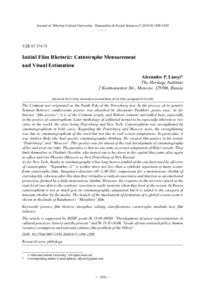Показать сокращенную информацию
Initial Film Rhetoric: Catastrophe Measurement and Visual Estimation
| Автор | Liusyi, Alexander P. | en |
| Автор | Люсый, А.П. | ru_RU |
| Дата внесения | 2016-05-30T10:12:17Z | |
| Дата, когда ресурс стал доступен | 2016-05-30T10:12:17Z | |
| Дата публикации | 2016-05 | |
| URI (для ссылок/цитирований) | https://elib.sfu-kras.ru/handle/2311/20269 | |
| Аннотация | The Crimean text originated as the South Pole of the Petersburg text. In the process of its genesis Semyon Bobrov’s cumbersome poetics was absorbed by Alexander Pushkin’s poetic ease. As for literary “film poetics”, it is of the Crimean origin, and Bobrov remains unrivalled here, especially in the poetics of catastrophism. Later mythology of selfdenial turned to be especially inherent to two cities in the world, the cities being Petersburg and New York. Catastrophism was strengthened by cinematographism in both cases. Regarding the Petersburg and Moscow texts, the strengthening was due to cinematographism of the word but not due to real screen adaptations. In particular, it was Andrew Bely who had specific cinematographic thinking. He created film poetics in his novels “Petersburg” and “Moscow”. This poetics was far ahead of the real development of cinematography of his and even our time. The paradox is that no one aims at screen adaptation of Bely’s novels. They limit themselves to Vladimir Sorokin, who turned out to be closer to the capital that came alive again as office and raw Phoenix (Moscow as New Petersburg of New Russia). As for New York, thanks to cinematography it has long been a symbol of the city destroyed by all sorts of catastrophes. “September 11” is neither more nor less than a symbolic repetition of many scenes from catastrophe films. Imaginary disasters till 11.09.2011 compensate for a monotonous rhythm of everyday life, whereas after this date they virtualize a radical experience and function as an emotional protection, formed by a daily monotonous rhythm. However, the response to the terrorist attack at the state level was akin to the cowboys’ reaction to early westerns when they fired at the screen. In Russia catastrophism is not as much gets its cinematographic adaptation but it is added to the category of museum ehxibits by the media. The launch of the mechanism of formation of a global screen room is shown in the finale of Balabanov’s “Morphine” film | en |
| Аннотация | Крымский текст возник как южный полюс петербургского текста. В процессе его генезиса громоздкая поэтика Семена Боброва была поглощена поэтической легкостью Александра Пушкина. Литературная же «кинопоэтика» имеет изначально крымское происхождение, и здесь Бобров остается пока вне конкуренции, особенно в поэтике катастрофизма. В дальнейшем двум городам в мире оказалась особо присуща мифология самоотрицания – это Петербург и Нью-Йорк. В обоих случаях катастрофизм оказался усилен кинематографизмом. В случае с петербургским и московским текстами это усиление произошло кинематографизмом слова, а не реально осуществившихся экранизаций. В частности, особым кинематографическим мышлением обладал Андрей Белый, создавший в романах «Петербург» и «Москва» поэтику кино, намного опередившую реальное развитие кинематографа своего и даже нашего времени. Парадокс в том, что никто не ставит своей задачей экранизацию романов Белого, ограничиваясь Владимиром Сорокиным, оказавшимся ближе сборной столице, возродившейся, как офисный и сырьевой Феникс (Москва как Нью-Петербург новой России). Нью-Йорк же именно благодаря кинематографу давно уже стал символом разрушаемого всевозможными катастрофами города. «11 сентября» не что иное, как символическое повторение многих сюжетов фильмов-катастроф. Воображаемые бедствия до 11.09.2011 компенсируют монотонный ритм повседневности, а после – виртуализируют радикальный опыт и функционируют как эмоциональная защита, сформированная повседневным монотонным ритмом. Впрочем, реакция на сам терракт на государственном уровне оказалась сродни реакции ковбоев на первые вестерны, стрелявших из зала по экрану. В России катастрофизм не столько кинематографизируется, сколько медийно музеефицируется. Запуск механизма формирования глобального просмотрового зала обозначен в финале фильма Балабанова «Морфий» | ru_RU |
| Язык | en | en |
| Издатель | Сибирский федеральный университет. Siberian Federal University | en |
| Является частью серии | Журнал Сибирского федерального университета. Гуманитарные науки. Journal of Siberian Federal University. Humanities & Social Sciences;2016 9 (5) | en |
| Тема | poetics | en |
| Тема | metaphor | en |
| Тема | film rhetoric | en |
| Тема | editing | en |
| Тема | classifications | en |
| Тема | catastrophe | en |
| Тема | medium | en |
| Тема | text | en |
| Тема | film industry | en |
| Тема | поэтика | ru_RU |
| Тема | кинориторика | ru_RU |
| Тема | метафора | ru_RU |
| Тема | монтаж | ru_RU |
| Тема | классификации | ru_RU |
| Тема | катастрофа | ru_RU |
| Тема | медиум | ru_RU |
| Тема | текст | ru_RU |
| Тема | киноиндустрия | ru_RU |
| Название | Initial Film Rhetoric: Catastrophe Measurement and Visual Estimation | en |
| Альтернативное название | Начальная кинориторика: исчисление и глазомер катастрофы | ru_RU |
| Тип | Journal Article | |
| Тип | Published Journal Article | |
| Контакты автора | Liusyi, Alexander P.:The Heritage Indtitute 2 Kosmonavtov Str., Moscow, 129366, Russia; E-mail: allyus1@gmail.com | en |
| Контакты автора | Люсый, А.П.:Институт наследия Россия, 129366, Москва, ул. Космонавтов, 2 | ru_RU |
| Страницы | 1198-1209 |

